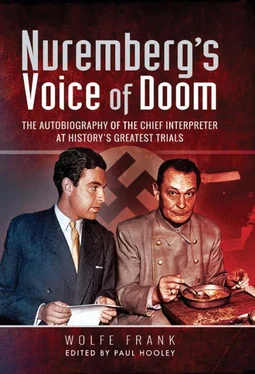The status Diels was occupying in Nuremberg was so far outside any of the known categories – he was not a witness, not a prisoner, not a potential defendant, not a free man – that we had some trouble keeping him close at hand. He was, for the moment, living in the building set aside for German witnesses for the prosecution, however as he wasn’t one of those, the officer in charge wanted him out. He could not be let loose into the community because the Germans would have arrested him. I could not put him up in my house in Nuremberg, as I had in Bad Oeynhausen, because my CO, Colonel Hugh Turrell, was a stickler for the rules and kept sniffing around our billets. He would have had a heart attack if he had found Diels in a ‘billet, British officers, for the use of.’
Diels came up with the solution himself but an account of it will require some degree of camouflage of identities.
Many years earlier Diels had had a blistering love affair with a young lady, a gifted musician, who was hotly pursued by Dr Goebbels [4] Paul Joseph Goebbels (1897-1945) was Germany’s Minister of Propaganda from 1933 to 1945 and one of Hitler’s closest associates and most devoted followers. He advocated progressively harsher discrimination against the Jews, including extermination in the Holocaust. On 30 April 1945, Goebbels succeeded Hitler as Chancellor, the following day he and his wife committed suicide, after poisoning their six children with cyanide.
(not in his capacity as patron of the arts). Diels had successfully protected the damsel, who was not German, from Goebbels’ unwanted attention. This lady was now living somewhere outside Nuremberg, having married into a well-known Bavarian family. Diels felt that Marianne (as we shall call her) and her husband might put him up, as they had all been quite friendly in the past.
I made a call at the house where Marianne lived, some 25km from Nuremberg. She was indeed beautiful, charming and unusually intelligent. I had them investigated by the CIC before I called and found that the husband had had his problems with the Nazis and the Communists within his factory, who had denounced him to both the Americans and the German de-Nazification office as well.
My friend at the CIC and I cleaned up the mess and Marianne’s husband, who looked quite terrified when I made my first call in British uniform, began to relax and, yes, of course, he would welcome Dr Diels as a guest to his house. Marianne had listened to it all with a Cheshire Cat’s smile and refrained from making any comment.
So Diels was moved, promised not to run away, just as his host had promised not to let him, and there he remained, true to his word until I left Nuremberg in November 1947. (He was, in fact, still there two years later when I dropped in on them all. I noticed then, as I had before, how close the rapport between him and Marianne seemed to be, but that was, surely, no concern of mine. During my long stay in Nuremberg I spent many a happy weekend in that house and it is regrettable that, for reasons of tact and discretion, no more than that can be told).
The last time I saw Diels [5] Rudolf Diels presented an affidavit for the prosecution at the Nuremberg Trials and was also summoned to testify in Goering’s defence. After 1950 he served in the post-war government of Lower Saxony and then in the Ministry of the Interior. He died on 18 November 1957 when his rifle accidentally discharged while he was hunting.
was in June 1949 when I was collecting material for a series of articles that I wrote for the Paris edition of the New York Herald Tribune . [6] Following the Nuremberg Trials Wolfe Frank risked his life again by going underground in both West and East Germany to write a series of articles for the New York Herald Tribune (NYHT). During this period Diels was instrumental in bringing to Frank’s attention the whereabouts of one of the highest ranked Nazi officers on the Allies most wanted list. Single-handedly Frank tracked him down, confronted him and turned him over to the authorities, not before however he had personally taken the Nazi’s confession. The fascinating story of Frank’s undercover operations for the NYHT are the subject of a separate volume entitled The Undercover Nazi Hunter: Unmasking Evil in Post-war Germany soon to be published by Frontline Books.
We went for a long walk while Marianne was preparing our meal. He told me of the long, uphill struggle he had had, trying to avoid a harsh verdict under the still functioning de-Nazification proceedings. Diels’s farm near Hanover was, he told me, still being held by British Property Control. [7] Many German-owned properties and estates were seized by the Property Control Division and handed over to reliable Germans or were held by the Board until the Control Council decided how to dispose of them in the interests of peace.

26. FAMILY REUNIONS
BACK IN BAD OEYNHAUSEN IN 1945 my days in the compound were coming to a close with BWCE being rapidly brought up to full strength. We now had translators, clerks, drivers, a quartermaster and all the other paraphernalia that seems to be accumulated wherever an army unit is functioning. This included a number of lorries and Mercedes saloons for officers, one of which had been assigned to me. Within the unit we had three officers, six NCOs and some thirty ORs. Leslie Hill was still with us and we had been joined by Captain Emsley, who was also a linguist.
By the time we received our orders to set off for Nuremberg I had long made up my mind not to take the shortest and quickest route. There were two people I wanted to find first – my mother, from whom I had had no news for over two years, and, if at all possible, my ex-wife Maditta.
We had been instructed as to which route the unit was to take, and it was only after we had left the compound that I told my driver about the planned detour. There wasn’t much he could do about it and, in any case, he didn’t care a hoot.
We went from Bad Oeynhausen to the Allgau [1] The Allgau is a region in southern Germany that covers parts of the south of Bavaria and parts of Austria and stretches from the pre-alpine lands up to the Alps.
where my mother had been living when I last had news from her (indirectly, of course) and I soon found the elderly woman who had once, during my childhood years, been our housekeeper. Yes, she knew where my mother was and I found her in less than an hour.
She was feeding chickens when I arrived. She had aged terribly and she looked much older than her sixty-seven years. We had not seen each other for seven years; seven years that had been a nightmare for her. She cried at first of course and then she told me of her ordeal. After our last meeting, in Switzerland in the spring of 1939, she had decided to leave Pasing, where we had lived together, and to move to the Allgau where a former governess of mine had promised to find a flat for her, and this is where she was living when war broke out. For some time, nothing changed. There were blackouts and air-raid drills, and rationing was severe, however people were being decent to her.
Then one day in January 1941 an army officer called at her home, which was close to a tiny airfield. She was told I had joined the British Forces and might try to use her, for instance, to give signals for landings on that airstrip, and she would therefore have to leave at once. The local party organisation was taking over, following orders from the military.
That was when her misery began.
She was given just forty-eight hours to move out. No alternative accommodation was available. No, nobody was going to help her. She had, furthermore, been married to a suspicious man, possibly English, and possibly a Jew, and she was required to supply her ‘ Ariernachweis ’ (proof of pure German race) immediately if she wanted to stay out of a concentration camp. My former governess provided a roof over her head and she spent endless hours, writing for documents, collecting birth certificates and resurrecting her pedigree. When it was done, she was told that she was under grave suspicion but would remain free. Her ration coupons, however, were withdrawn, she was not allowed to travel and her health insurance was annulled. Theoretically, she was condemned to death through starvation, or exposure, or illness, but our friends from the days long gone didn’t let that happen. So, there she was, feeding their chickens and helping them where she was able, when I suddenly turned up, not as she was quick to say, in the least bit unexpectedly.
Читать дальше













